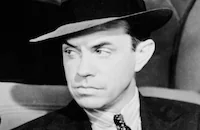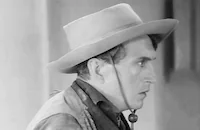Winterset
Brief Synopsis
Cast & Crew
Alfred Santell
Burgess Meredith
Margo
Eduardo Ciannelli
Maurice Moscovitch
Paul Guilfoyle
Film Details
Technical Specs

Synopsis
In 1920, in a town near New York City, a factory paymaster is robbed and killed, and Italian radical Bartolomeo Romagna is wrongfully arrested and executed for the crime. Sixteen years later, Liggett, a law school professor, concludes that the exclusion of the testimony of a key witness, gangster Garth Esdras, during Romagna's trial, had denied the Italian his justice. News reports of Liggett's findings come to the attention of three people: Judge Gaunt, who had sentenced Romagna; mobster Trock Estrella, the real murderer; and Romagna's son Mio. Worried that Garth, who has been leading a reclusive life since the trial, will now expose him, Trock visits him in his Brooklyn tenement and warns him to be silent. That night, Garth's sister Miriamne happens to meet Mio under the Brooklyn Bridge and, unaware of their connection to each other, falls instantly in love with him. Later, the couple meets again in a square and dance to a hurdy-gurdy. During this romantic interlude, a half-crazed Gaunt arrives in the square, searching for Garth. After being soaked by a winter rain storm, Mio tells Miriamne about his father and his need to prove his innocence. Without revealing her relationship to the case, Miriamne advises him to find Garth. Then in the Esdras' tenement, Gaunt questions Garth to appease his own doubts, while Mio tries to force a confession from him. Soon Trock, who has just had Shadow, another witness to the paymaster's murder, shot, arrives and threatens both Mio and Gaunt. Wounded but alive, Shadow bursts through the door and tries to shoot Trock, but dies before he can pull the trigger. At that moment, the police show up looking for Gaunt, but because Garth has hidden Shadow's body, they discount Mio's accusations of murder. Trock leaves with more threats, but a driven Mio tells Miriamne that he is going out to tell the world his story. Torn between her love for her brother and for Mio, Miriamne finally follows Mio, who is caught in the square by Trock and his gunman. Soon after, Garth, overcome by guilt, runs into the street and is shot by the gunman. Still trapped, Mio starts to play the prohibited hurdy-gurdy to attract the police and, to his and Miramne's relief, is arrested. The gunman then mistakenly kills Trock, at last freeing Mio and Miriamne from their pasts.

Director
Alfred Santell
Cast

Burgess Meredith

Margo

Eduardo Ciannelli
Maurice Moscovitch

Paul Guilfoyle

Edward Ellis

Stanley Ridges

Mischa Auer
Willard Robertson
Alec Craig

John Carradine

Myron Mccormick
Helen Jerome Eddy

Barbara Pepper
Fernanda Eliscu
George Humbert
Murray Alper

Paul Fix
Crew
Pandro S. Berman
John L. Cass
Perry Ferguson
William Hamilton
Peverell Marley
S. Barret Mccormick
Elizabeth Mcgaffey
Van Nest Polglase
Nathaniel Shilkret
Darrell Silvera
Anthony Veiller
Vernon Walker

Film Details
Technical Specs

Award Nominations
Best Art Direction
Best Score
Quotes
Trivia
Burgess Meredith, in his film debut, recreates the role he played in the original Broadway production.
Notes
Maxwell Anderson's play won the 1935 Drama Critics' Circle Award. Burgess Meredith and Russian-born stage actor Maurice Moscovitch made their Hollywood screen debuts in this film. Meredith, Margo, Eduardo Ciannelli and Fernanda Eliscu appeared in the original New York stage production, and Myron McCormick replaced Ciannelli in the same show. Several reviewers noted the similarities between Anderson's play and the Nicola Sacco-Bartolomeo Vanzetti case. The New York Times review stated that the reference to the Italian Americans' infamous 1921 trial and their execution in 1927 after a reopening of the case was "thinly disguised." The play's tragic ending was altered for the film. In the play, "Garth" lives and both "Miriamne" and "Mio" are shot and killed by "Trock's" gunman. Although the film, which modern sources state was budgeted at $400,000, was billed as a successor to the critically and financially successful The Informer, it did not do well for RKO.
According to modern sources, Anne Shirley was first considered for the role of "Miriamne." Motion Picture Herald's "In the Cutting Room" includes Sidney Toler, Murray Kinnell and Bobby Caldwell as cast members, but their participation in the final film has not been confirmed. Art director Perry Ferguson and musical director Nathaniel Shilkret received Academy Award nominations for their work on the film. Film Daily voted the film one of the year's ten best in its annual poll of film critics.
Modern sources add Alan Curtis (Sailor), Arthur Loft (District attorney), Otto Hoffman (Elderly man), Al Hill (Gangster), Bobby Caldwell (Mio as a boy) and Grace Hayle to the cast. In 1948, the Mexican subsidiary of RKO released an adaptation of Winterset, A la sombra del puente, set in Mexico and starring Ester Fernàndez and David Silva. Winterset was presented twice on television, in 1951 by the ABC broadcasting network, with Richard Carlyle and Eduardo Ciannelli, and in 1959 by the NBC broadcasting network and Hallmark Hall of Fame, with Don Murray, Piper Laurie and George C. Scott.

Miscellaneous Notes
Released in United States 1936
Released in United States 1936











